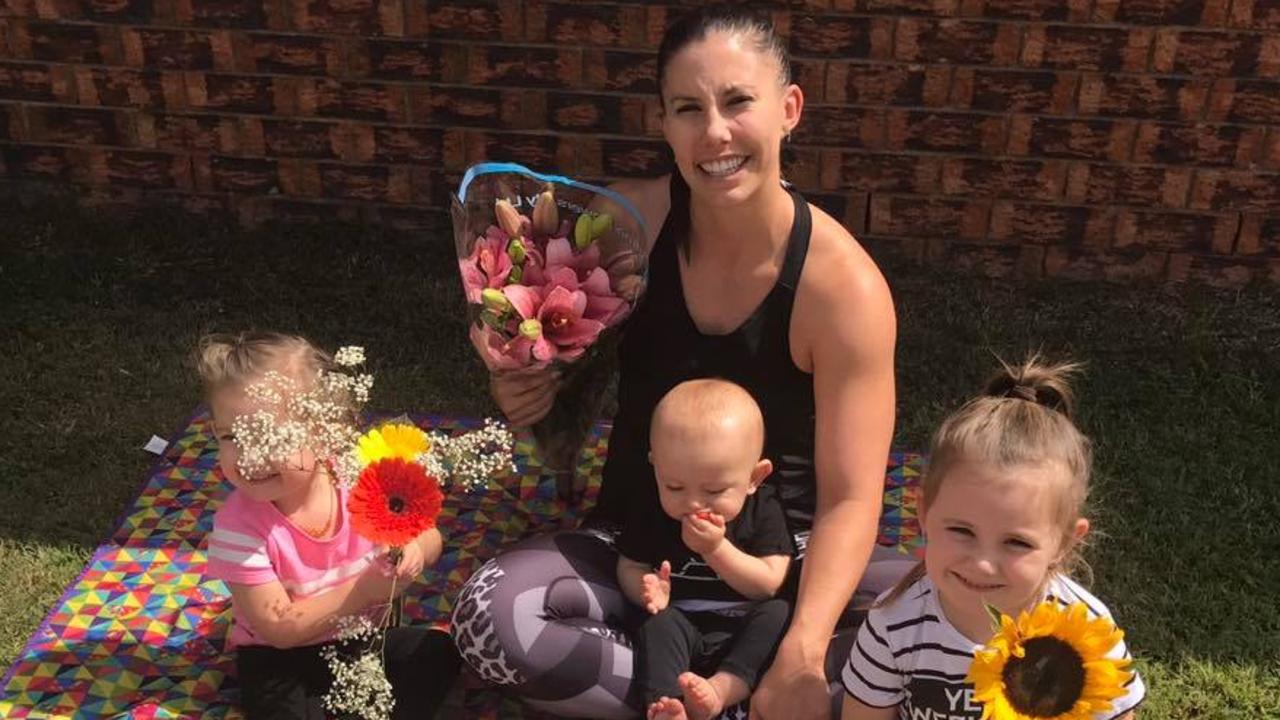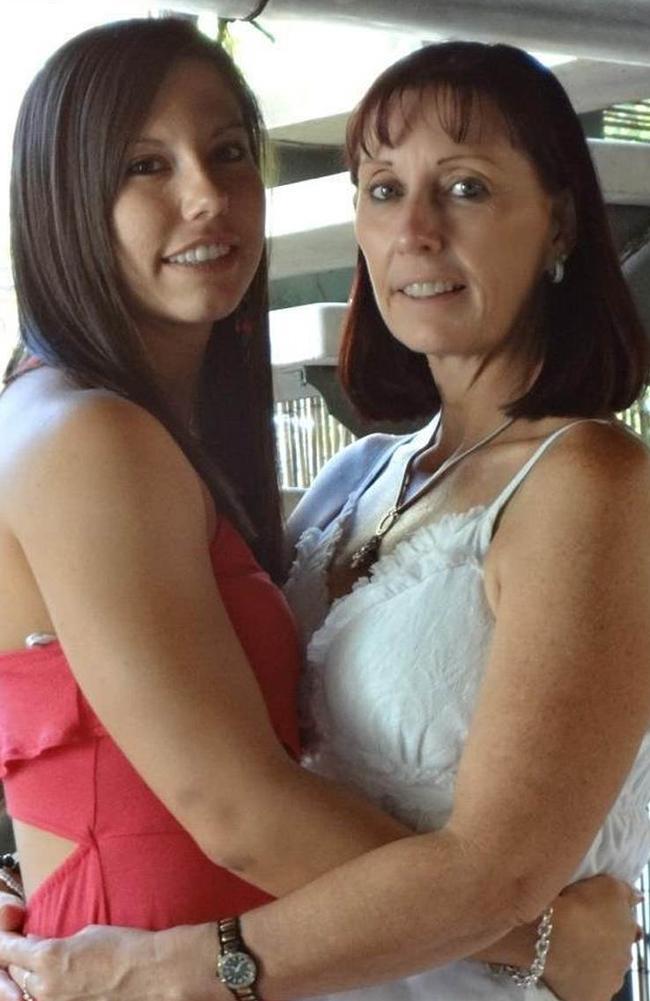Domestic violence: Hannah Clarke’s devastating question before her murder
A week before Hannah Clarke and her three children were ambushed by her estranged husband, she asked her mother a devastating question.
A week before Hannah Clarke and her three children were ambushed by her estranged husband, Rowan Baxter, on a street in Brisbane’s Camp Hill, she asked her mother a devastating question.
The 31-year-old — along with her daughters, six-year-old Aaliyah and four-year-old Laianah, and three-year-old son, Trey — was staying with her parents, Sue and Lloyd Clarke, after leaving Baxter — at the hands of whom she had suffered years of psychological abuse and controlling behaviour.
“Things like going through her phone, ringing her all through the day, checking where she was, if she’d locked up the gym — he would ring her,” Sue recalled in the final episode of the SBS’s See What You Made Me Do, a three-part series examining Australia’s domestic violence epidemic.
“She wasn’t allowed to walk off the beach in her bikini. She wasn’t allowed to wear pink because ‘that was for children’.”
Promising in a lavish wedding ceremony to look after Hannah, Baxter, 42, would demand sex every night — refusing to speak to her “for days if she wasn’t enthusiastic”, Sue said, “sulking” or threatening to kill himself.
“When I said, ‘It’s domestic violence’, she said, ‘He’s never hit me Mum’,” Sue said.
“You could see, it was mental, though,” Lloyd said. “She was a broken woman before she left.”
On average, one woman a week is murdered by her current or former partner.
Almost 10 women a day are hospitalised for assault injuries at the hands of a spouse or domestic partner.
Every day in May, as part of Domestic and Family Violence Month, news.com.au will tell the stories behind these shocking statistics.
RELATED: ‘Disturbing’ reason girl avoided friends

Hannah “could never tell” Baxter she was going to leave, Sue explained.
“It was too dangerous. She knew it was too dangerous. He would never let her go. So eventually, she was at the gym with her two best friends and Nikki (Brooks) said to her, ‘This is it, we’re going to do it. He’s at work today, we know he’s at work. We’ll go home, get Aaliyah from school’, and she did it,” she said.
When their daughter and grandchildren arrived at their house, Sue said they had just “two garbage bags of things, belongings, for her and the three children”.
More importantly, though, Hannah “felt so good once she got here. She said it felt like a whole weight had been lifted off her”.
That feeling didn’t last long. After Baxter — who had been granted visitation with their children — kidnapped Laianah, he was no longer “allowed the children until there was mediation, and we had something in place that guaranteed we’d get the children back”, Sue said.
“Once he started losing control, he spiralled. And he started spiralling bad. We were concerned, the whole time, that he would turn up. I put locks on the gates, down the side and under the house, just so he couldn’t get in,” Lloyd said.
Hannah was clearly frightened, Sue said. “She actually said to me, ‘Who gets the children when he kills me, Mum?’ And he killed them a week after.”
RELATED: Sinister reason mum didn’t go to work


What happened next made headlines around Australia and the world. Baxter ambushed Hannah and their children outside Sue and Lloyd’s home as they climbed into the car for their morning school run.
He doused them in petrol and ordered Hannah to drive towards Whites Hill Reserve, a 170-hectare tract of bushland nearby, a knife to her throat.
“So she drove down the street, and turned the corner, where she spotted a fellow on the other side of the street washing his car. She just drove straight at him, screaming out. She had her window down, saying, ‘Call the police, call the police, he’s thrown petrol over us’,” Sue said.
“And when he looked up, Rowan had Hannah in a bear hug and wouldn’t let her go and she was fighting to get out. There was an almighty flash. And Hannah got out, and she was on fire.”
The man told Hannah to “hit the ground and roll, and he hosed her. And this fellow never realised the children were in the car”.
Baxter then stabbed himself to death with his knife — not living to witness Hannah’s extraordinary strength: while she later died in hospital from the burns to 97 per cent of her body, she still managed to give police a clear and articulate statement, not once, but twice.
RELATED: Husband’s simple request hid big ‘red flag’
In the year since Hannah and her children’s deaths, calls to criminalise coercive control have steadily gotten louder in Australia.
“Do we seriously believe that we didn’t know that Hannah Clarke’s murderer was not a possible killer of her? Every red flag was flying, every red flag, but we didn’t intercede,” author and domestic violence activist, Phil Cleary, said.
“I want to say to Hannah Clarke’s family — don’t think you got it wrong. You did not. You got it right. You told people, your daughter told people. She told the police, the courts knew. The failure was in the state.”
While criminalising coercive control will not “magically fix our deeply flawed justice system”, series host, journalist and author Jess Hill, said, “it will replace the broken lens we have on domestic abuse”.
“Instead of seeing a collection of incidents, it will make visible the system of abuse that endangers, and even kills, so many women and children,” she said.
“The need to understand and detect coercive control is urgent. Not just because of the immeasurable impact it’s having on hundreds of thousands of Australians, but because controlling behaviour is typical in men who murder their wives and kids.”
See What You Made Me Do concludes tonight at 8:30pm on SBS, SBS On Demand and NITV. Immediately following tonight’s finale, Jess Hill will join a panel of experts in a one-hour The Feed forum to discuss possible solutions to domestic abuse in Australia.
If you have a story you want to share confidentially, please email natalie.brown@news.com.au




